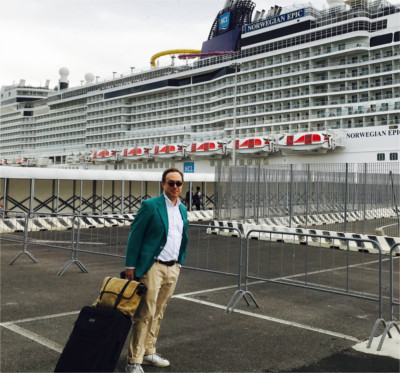 An Oxford-trained archaeologist and journalist, Vernon Silver is a correspondent in Rome for Bloomberg News’ Projects and Investigations team. His reporting on finance, art and culture has appeared in Bloomberg Businessweek, The New York Times, the Boston Globe, Spy magazine, and other publications. Silver won the OPC’s Morton Frank award in 2001, and has also won a George Polk Award. He’s the author of The Lost Chalice: The Epic Hunt for a Priceless Masterpiece (William Morrow, 2009). Silver graduated from Brown University, studied Egyptology at the American University in Cairo and earned a master’s and doctorate in archaeology at Oxford.
An Oxford-trained archaeologist and journalist, Vernon Silver is a correspondent in Rome for Bloomberg News’ Projects and Investigations team. His reporting on finance, art and culture has appeared in Bloomberg Businessweek, The New York Times, the Boston Globe, Spy magazine, and other publications. Silver won the OPC’s Morton Frank award in 2001, and has also won a George Polk Award. He’s the author of The Lost Chalice: The Epic Hunt for a Priceless Masterpiece (William Morrow, 2009). Silver graduated from Brown University, studied Egyptology at the American University in Cairo and earned a master’s and doctorate in archaeology at Oxford.
Hometown: New York
Languages: Italian, Spanish and basic Arabic, Portuguese and French.
First job in journalism: Reporter, The Key West Citizen.
Countries reported from: Antigua, Bahrain, Belgium, Cuba, France, Germany, Greece, Haiti, India, Israel, Italy, Iraq, Jordan, Lebanon, Libya, Malaysia, Malta, Palestinian Territories, Portugal, Hong Kong, Saudi Arabia, Spain, Philippines, Qatar, Switzerland, Tunisia, Turkey, UAE, U.K, Vatican City and Vietnam.
Year you joined the OPC: 2002.
Most over-the-top assignment: Going under cover on a cruise ship to investigate offshore art auctions for Bloomberg Businessweek. (I tried to dress the part to blend in, but nobody else was wearing a teal sports coat.)
How does archaeology inform your work as a journalist? In both fields you’re digging up things and writing about them. Techniques that underpin archaeology and anthropology can be important tools for journalists, too – helping them understand change over time, or showing how goods, ideas or people circulate and interact. Newspaper stories that trace where your T-shirt or French fries come from have a whole body of academic literature behind them that journalists might not know about.
Major challenge as a journalist: Connecting every dot in an investigation to remove any need for modifiers, vague language or hypotheticals. One such example was a Bloomberg story that linked a single piece of surveillance equipment made by a specific company to the torture of a dissident – all of whom were named.
Worst experience as a journalist: Being lied to.
How did you get the idea for The Lost Chalice? A trial here in Rome put the spotlight on how American museums stocked their display cases with artefacts looted from tombs in Italy. The reporting around the trial led me to a smuggler who led me to a rare Greek vase that had been missing for decades, which led to the book. The tale is told as the 2,500-year biography of a pot and the nutty mix of curators, collectors and tomb robbers that swirl around it.
When traveling, you like to … : Order a club sandwich from room service while writing on deadline.
Hardest story: Physically, Iraq in Spring 2003, for the heat. Mentally, any contentious story involving both complex subject matter and powerful people or institutions.
Journalism heroes: My wife, @nwinfield. And OPC legends Edith Lederer and Morley Safer.
Advice for journalists who want to work overseas: Learn a foreign language. I keep seeing reporters with relatively minimal experience get a foot in the door that way, both at home and abroad.
Dream job: Any job where I can follow my curiosity while having fun and impact. A Bloomberg Businessweek feature I wrote sparked a trial over Led Zeppelin’s authorship of Stairway to Heaven last year – so the job I’ve got now.
Favorite quote: “Comfort the afflicted and afflict the comfortable.”
Place you’re most eager to visit: Finland, Scandinavia or Alaska. (After all these hot places, some snow and the northern lights would be good.)
Most common mistake you’ve seen: Assuming the dominant narrative is right. From Saddam Hussein’s WMD to Trump not having a shot at winning, going with conventional wisdom can be dangerous.
Country you most want to return to: Japan.
Twitter handle: @VTSilver
